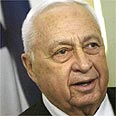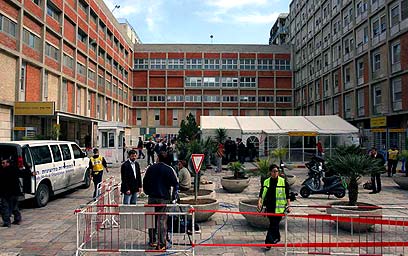
Prime Minister Ariel Sharon’s emergency operation was completed successfully Saturday afternoon after nearly four hours, Jerusalem’s Hadassah Hospital said.
Parts of the prime minister’s intestine have been removed, the hospital added.
Hadassah Hospital Director Shlomo Mor Yosef will brief reporters on Sharon's condition at 5 p.m.
Earlier Saturday, the hospital said Sharon's life was in danger, but following the surgery the prime minister's advisors sounded more optimistic and said "the situation looks less severe at this time."
Sharon was rushed to surgery Saturday morning after a CT scan revealed a deterioration in his condition. Doctors said a scan performed on Sharon showed his digestion track had been severely damaged.
Yael Bossem-Levy, spokeswoman for the hospital, said Sharon's condition has worsened and his life is in danger. In light of the damage, it was decided to immediately operate on Sharon, Bossem-Levy said in a statement.
"Sharon's life is in danger," Bossem-Levy told The Associated Press in a phone call after the statement was issued. Later, one aide told Reuters on condition of animosity that the surgery’s results are good, but refused to elaborate
The operation began at about 11 a.m. Saturday and ended by 3 p.m.

Hadassah Ein Kerem Hospital in Jerusalem (Photo: Gil Yochanan)
Sharon's son Omri rushed to the hospital Saturday morning and other family members and aides were on their way.
Sharon had been stable for the past five weeks, but his condition worsened before dawn Saturday, the hospital said.
Risk of poisoning
Doctors familiar with Sharon’s treatment said swelling was identified in the prime minister’s abdomen on Thursday. A blood test indicating high levels of blood cells and a rise in body temperature, raised suspicions that the prime minister is suffering from an infection.
The head of the emergency unit at the Soroka Medical Center in Be'er Sheba, Dr Yaniv Almog told Ynet that from media reports he suspects Sharon is suffering a blood circulation problem with blood failing to reach his digestive system.
“It can be very significant, but the seriousness of the problem depends on its extent. I believe surgery will provide answers to these questions,” Almog told Ynet.
“Clotting and high blood pressure can block veins and cause faulty blood circulation. Infections in the digestive system may cause poisoning. Another danger is that the stomach may become porous and poison the body,” he added.
Sharon’s health saga
Sharon suffered a massive stroke on Jan. 4 and has been unconscious ever since. A CT scan of his brain earlier this week showed that he remained in serious but stable condition.
Sharon had on Feb. 1 had a feeding tube inserted in his stomach, an indication that his doctors are thinking in terms of long-term care for the 77-year-old Sharon.
The CT scans have been used to assess bleeding and swelling in Sharon's brain. According to past hospital statements, there have been no changes in the results of the scan in recent weeks, but Sharon has failed to regain consciousness.
Sharon suffered a stroke with what was described as "significant" bleeding in his brain a day before he was to check into Hadassah Hospital for a procedure to correct a tiny defect in his heart that was said to have contributed to a mild stroke he suffered two weeks earlier.
Doctors have come under fire from critics who questioned whether Sharon should have been treated with massive doses of anticoagulants after his first stroke, which was caused by a small blood clot in a cranial artery. Doctors admitted that the anticoagulants made it more difficult for them to stop the bleeding from the later hemorrhagic stroke.
The extensive bleeding and the lengthy operations Sharon underwent to stop it have led experts to conclude that he must have suffered severe brain damage and was unlikely to regain consciousness. If he does awaken, most say, the chances of his regaining meaningful cognition or activity are slim.
Efrat Weiss, AP and Reuters contributed to this report















